Against ad-blocking.
The Internet has changed the way we access information; we are constantly looking at our smartphones, tablets and computers to watch the news and videos, check our emails and use social networks. We take these things for granted without ever really thinking about the cost of providing these pieces of information. Using ad blockers will prevent the free access of professionals who are willing to share their knowledge and passion. People who share their expertise on the net have to pay for their equipment, computers, camcorders, web hosting, utility bills and so on, in order to provide you with interesting content to learn from or enjoy. This content has to be practical, well prepared, researched and formatted to make it attractive enough for an audience. The bottom line is: online content has a cost.
If we want to keep our free Internet we all need to contribute.
Authors, journalists, researchers and bloggers all dedicate their time and intellect to producing great content, most of the time for free. The least we can do for these people is to thank and support them by allowing a few ads on our screens. Most websites feature non-intrusive ads, as we all hate pop-ups and auto-playing videos – these kinds of sites are seen as spammers and receive few visitors unless they offer hot streaming videos, illegal downloads or pornographic content, which drain a lot of traffic. In this situation, I can understand the use of ad blockers. But overall, using an anti-advertising system does more harm than good, especially for YouTubers.
A subscription service is part of YouTube’s plan to find a way around ad-blocking programs. Launching on the 22 of October 2015, Google has now introduced a paywall called Youtube Red, which allows viewers to watch videos without ads and to access more videos.
Clearly, the fact that more and more users are choosing to block ads, as well as the cost of the infrastructure (around £2.5 billion) is a limitation of the current business model. As strange as it may sound, with more than 1 billion monthly viewers, Google does not make a profit from YouTube. This most likely explains why Google has never actually fought back against the anti-ads systems.
The question is: who is taking advantage of that system? The viewer, who avoids five seconds of ads on YouTube, or maybe Adblock Plus, the most popular plugin for Internet browsers? Yes! Eyeo GmbH, the company that owns Adblock Plus, receives money from Google, Microsoft, Amazon and Taboola to whitelist their ads. I don’t know for sure exactly how much this unethical company receives to whitelist Google’s Ads, but rumour has it that it is around $25 million. Eyeo was accused of highway robbery by Scott Cunningham, Senior Vice President of the Internet Advertising Bureau. In my opinion it is extortion to block ads and charge money to unblock them; however, it is an ingenious idea!
Ad Blocking on the rise
According to PageFair, more and more users are installing ad-blocking software. AdBlocking is most popular among younger users – 41% of Internet users aged between 18 and 29 used the AdBlocking software, rising to 54% if only young males are counted.
Businesses therefore have to find other ways of generating their earnings, if they are to avoid losing money. Unless we come to our senses regarding the ethics of ad-blocking and cease using it, YouTube Red is just the beginning. This is not good for the future of the web

Comments are closed.